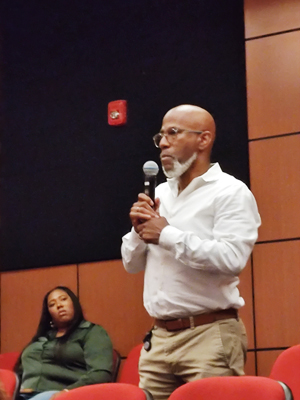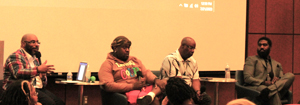
By Angie Hayes
The Truth Reporter
On Friday July 21, the National Alliance on Mental Illness Greater Toledo (NAMI)’s African American Leadership Initiative 10th Annual Summit, held at Toledo Lucas County Main Branch Library, several speakers provided information and knowledge on gun violence and how it affects African American men’s mental health. The goal and focus of the event was to promote mental health and wellness and safety in the African American community and to support leaders to work towards those goals.
Traumatic situations can be linked to mental health problems, a number of speakers noted. Mental health triggers can be caused by events or circumstances that can establish difficult emotional or psychiatric indicators including anxiety, panic, or negativity to self and create discouraged feelings. When trauma is experienced, it must be addressed to resolve the issues the trauma will create.
During the NAMI event, gun violence and the impact the violence has was a main point that speakers discussed and provided knowledge, possible solutions and growth opportunities to the audience. The following information was provided by speakers and panel discussion enlightenment.
“I see on the news what is happening daily in the community; someone being victimized. For this, we want to make sure we keep the conversation on mental health and the impact on the community.” Sonya Quinn, NAMI.
Scott Sylak, Mental Health and Recovery Services Board executive director, shared information as well. “We are happy that we are able to participate. We all know gun violence is a major problem in our community. Gun violence harms the community and has a devastating impact on children and young people. We are working to make access to services more available in our community. And we are working to make Toledo safer: address mental wellness and violence reduction. We can create a future where gun violence is not a problem. We are here to create a better place to call home.”
Michael Carter, Lucas County Mental Health and Recovery Services Board director of Community Engagement and Equity stated: “We all play a role in the environment, but family/father needs to be first. So, one thing I want to let you know, if you happen to get triggered, you have a role available with therapists.”

Cecil Holston, clinical social work therapist, shared the following information to provide knowledge to the audience: “When you can relate to someone, it’s easier to open up to them. Therapy is having a conversation. Black male therapist for black man. Men struggle with vulnerability; we struggle because we don’t want to be vulnerable. We have to remind ourselves to be able to have opening and vulnerability; that is growth. Unpack years of trauma! Self-care…take minutes to LOVE self. Loving self in the moment, find something that you love in yourself. The brain cannot unwire itself; we all need someone to help us with that. Therapy.”
Willie Knighten, CEO Above & Beyond Care Behavioral Health, provided much information from his experience and knowledge to support growth in the atmosphere: “Mental health and gun violence. My sister was off work, took a shift for a friend and was shot and killed. I had a lot of trauma and triggers. But…we all have a voice. We can play a part and help those living with gun violence. Mental health is real. It’s not what you do, it’s how you do it. Help from a father for the youth is required. When a person needs mental health treatment, many resources are available from agencies on the First Wednesday event; every first Wednesday of the month at 11am at the Government Center. Many resources and information available.”
Charles Williams, Diversity Equity and Inclusion Manager, provided his personal information to support the atmosphere very well. “Who I am…. a professional husband and father. There is nothing wrong with being a family man. Generational success, black success, we have to share! Young people…own your space. We all need to expand our accountability and our responsibility is to do something. Fight and Refuse the thoughts and feelings that you’re not important.”
In addition to the shared knowledge and panel discussions, NAMI provided lunch and networking opportunities throughout the event to connect with community members. Opportunities provided to learn from experts and gain knowledge and strategies to improve mental health issues in our atmosphere.
